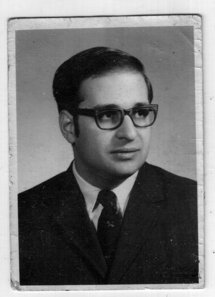In 1970, I was living my life exclusively Downstairs. I believed in “supernatural” powers, or wanted to, but I had no access, and no way of gaining access. (Besides—though I didn’t realize it then—my idea of supernatural powers was closer to Superman comics than to the real thing.) I had no guide, no idea where to go or what to do. But my Upstairs component improvised brilliantly as we went along, using whatever became available. It very efficiently used mescaline to teach me several lessons.
My first and only experience with mescaline came within a few weeks of Dave Schlachter’s death. I had come down to D.C. mostly to see Dennis, who had gotten a weekend leave. We both knew that he was going to Vietnam soon, and there was a very real possibility that I’d never see him again. We met at the apartment of one of our younger fraternity brothers who was still in school, along with another senior I knew slightly, and my ex-roommate Bill. One thing led to another; we were offered a chance to try the psychotropic drug mescaline, and we took it.
Dennis and I had gotten through college without trying drugs; our younger contemporaries were somewhat patronizing about our lack of experience. But now Dennis was going to do it and I wanted to stay with him, even though I was somewhat scared of the idea. So we paid our money (all of two dollars in 1970) and swallowed the capsules along with a little orange juice, and waited to see if something would happen.
It did! It woke me up!
Once it kicked in, it instantly and entirely (if temporarily) altered the way I experienced the world, at once magnifying my perception of things and reducing my field of focus. What I looked at, I really saw, for the first time. Until then my attention had been more on abstractions and thoughts and memories than on what was right there in front of me. I was astounded at how much I was missing. It was like the time I picked up the prints from my first roll of color film, and walked down an autumn street really seeing the turning leaves, drunk from sudden awareness of so much color in the world.
I looked at a print of a painting of a boat on the seashore, beached head-on, and suddenly experienced the front half of the boat sticking straight out into the room ahead of the plane of the painting. I realized that the artist was able to paint it that way because he was able to see it that way.
A friend put on some classical music; a flute trilled, and I heard it as a bird singing in a garden, and knew (on no other evidence) that this was what the composer was describing in a language normally all but closed to me. I liked classical music, but this was a revelation.
The walls, I realized, were alive! Literally. What I had been taking for dead matter was somehow alive in a way I couldn’t fathom, but couldn’t doubt. Reality wasn’t what I had thought it was.
I awoke in a different way, too. At one point I looked over at Dennis and started to say something about Dave, and he said thickly, “Don’t!” He explained, “It’ll tear us up, and I don’t want to do that.” For that moment I saw the depth of his feelings;. For that moment, his inner self was real to me.
At one point, as I realized how far above my usual mental routines I had been lifted by the energy set free by the drug, I said, “I’m not going back to that prison!” But one of my younger friends said contemptuously that I had no choice. And of course I didn’t. The drug wore off, and in a few hours I was back in ordinary consciousness.
But everything was different.
I had had a glimpse of what lay beyond. I didn’t know how to get back there, but I knew, now, that my intuitions on reading The Mind Parasites had been correct it, though my understanding had been inadequate. There was more available. Only—how to find it?
Many years later a psychic would see me as a shaman of a tribe in the desert somewhere in the southwestern United States or northern Mexico, “always going off by yourself on vision quests.” And during a course at The Monroe Institute, I had had a vision of myself as a shaman in that same desert. I won’t swear that either vision is accurate, but it would explain something that pleased and puzzled me during that mescaline trip. I always instinctively knew what I was doing. Despite having no intellectual preparation or experience, I continually “stumbled” into knowings. I was right at home, even while being amazed at myself.
Auras, for instance. As soon as I realized that we live in the middle of an energy sheath, I knew several things without knowing how I knew:
- The energy field would still be there to be sensed when I was no longer influenced by the drug. It wasn’t an illusion.
- As I moved my hands across someone’s aura, I could feel a gentle friction, and I knew that this was what Friedrich Mesmer was doing with his “mesmerizing” passes in the 1700s. He was aligning the energy somehow.
- I brought my hands near the temples of a friend who had not taken the drug, and knew that somehow this would enable or assist telepathic communication between us. (And this was before Star Trek I didn’t get the idea from Spock.)
But drugs were illegal, and therefore unregulated, hence there was no telling what you were going to get. And worse, they wore off. The mescaline trip was a wake-up call, a glimpse, not a permanent gain. What was I to do after the drug wore off?
